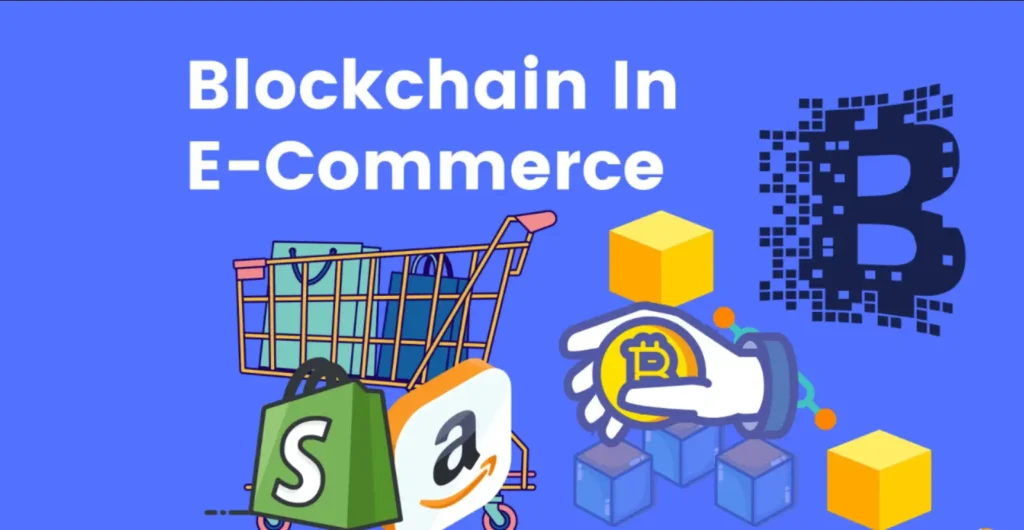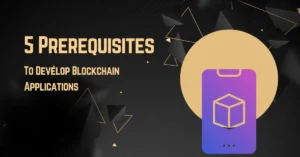Blockchain technology is transforming the way e-commerce operates, providing heightened security, transparency, and efficiency. It secures transactions and verifies product authenticity, revolutionizing online shopping.
Blockchain stands as a pivotal innovation for e-commerce, benefiting both B2B and B2C enterprises. It shields critical information from breaches. It establishes a reliable method for secure data sharing. Let’s explore how companies use blockchain in e commerce, its pros and cons and 5 ways blockchain in e-commerce can be applied.
What is blockchain and how does it work in e-commerce?
Blockchain is like a digital notebook that everyone can see and update. It’s super safe because once something is written in it, no one can change it. This makes it perfect for e-commerce.
In e-commerce, blockchain helps keep track of everything. For example, it can show where a product comes from and if it is real. This is great for buying things like shoes or electronics because you know they are not fake. Also, it makes payments faster and safer. When you buy something, the blockchain records your payment quickly. This means you get your stuff sooner and there are fewer chances of being cheated.
Blockchain also makes sure your information is private. It uses special codes to keep your details safe. So, blockchain makes shopping online easier, safer, and more trustworthy. Everyone can shop with peace of mind.

Commonly Used Blockchain Technology in E-Commerce
Blockchain technology is changing eCommerce in exciting ways. The commonly used blockchain technologies in eCommerce that make shopping better and safer.
Bitcoin
Bitcoin is a type of digital money. It lets people buy things online without using regular money. This is great because it works fast and doesn’t need a bank. People can send Bitcoin to pay for goods or services quickly and safely. All transactions are transparent and safe since blockchain technology remains used.
Ethereum
Ethereum is another popular blockchain. It is different because it lets people create smart contracts. A digital agreement is similar to a smart contract. It makes sure both buyers and sellers keep their promises. For example, if you buy a game, the smart contract makes sure you get the game once you pay. This helps avoid cheating and builds trust between buyers and sellers.
Hyperledger Fabric
This one is a bit different because it is used by businesses to manage their supply chains. Supply chains are how products get from the factory to your home. Hyperledger Fabric keeps track of every step a product takes. It shows where the product came from, who handled it, and if it’s real. This is useful for making sure products like food and medicine are safe.
These 3 blockchain technologies help eCommerce in many ways. Bitcoin makes payments easy and fast. Ethereum ensures that deals are fair with smart contracts. Hyperledger Fabric keeps track of products to make sure they are safe and real. Blockchain makes online commerce more reliable and safe.
Which Companies Use Blockchain in E-commerce?
Within e-commerce, Blockchain is causing a stir. This technology helps a lot of businesses run more efficiently. Look over a few examples.
One such company is Carrefour. Their food goods follow them from farm to shop using blockchain technology. This guarantees the safety and freshness of the food.
One more significant participant is Amazon. They provide blockchain solutions through their platform, Amazon Web Services. This facilitates other businesses’ usage of Blockchain.
In the fray is Alibaba. They provide a blockchain service similar to Amazon’s. Businesses may now use Blockchain without difficulty.
Walmart is also utilizing blockchain technology. It helps them to monitor their supply chain. Knowing the origin of their products is beneficial to them.
These businesses demonstrate the potential benefits of blockchain technology for online shopping. It can improve the efficiency and security of operations. It’s vital to remember, nevertheless, that there might be difficulties while using Blockchain. Rule and tech-related matters are among them.
Blockchain use cases in e commerce
Blockchain is a turning point in e-commerce. It’s a tech that ensures secure data transactions. Let’s explore its use cases in e-commerce.
Peer-to-Peer Payments: Blockchain allows direct payments. This cuts out middlemen, reduces costs, and makes transactions faster. Buyers and sellers benefit from it in the same way.
Supply Chain Management: Firms like Walmart use Blockchain to track their supply chain. This gives them a clear picture of where their products come from.
Personalized Product Offerings: Blockchain can help firms offer personalized products. This is based on reliable data, which leads to better customer service.
Verified Customer Reviews: Blockchain can help verify customer reviews. This makes reviews more trustworthy, helping customers make informed decisions.
Data Security: Blockchain enhances data security. It safeguards sensitive information with tamper-proof measures. As we live in a digital world, this is essential.
However, using Blockchain is not without challenges. These include technical issues, scalability problems, and regulatory considerations. So, firms need to be careful when implementing it.

Pros and cons of Blockchain in E-commerce
E-commerce is booming. It’s a world where buying and selling happen with a click. But, there’s a new player in town – Blockchain. Let’s explore its pros and cons.
Benefits of blockchain in e-commerce
- Trust and Transparency: Blockchain records every transaction. It’s like a digital ledger that no one can change. This builds trust between buyers and sellers. Everyone can see what’s happening, making e-commerce more transparent.
- Security: Blockchain is safe. It uses complex math to secure transactions. This impedes attacks by hackers. So, your e-commerce transactions are safer.
- Lower Costs: Traditional e-commerce has many middlemen. They all want a share of the profit. But Blockchain cuts them out. This lowers costs for everyone.
- Faster Transactions: Blockchain works 24/7. It doesn’t need banks to check transactions. So, payments are faster. This makes e-commerce more efficient.
Cons of Blockchain in E-commerce
- Complexity: Blockchain is new and complex. Not everyone understands it. This can make it hard for some people to use Blockchain e-commerce sites.
- Regulation: Blockchain is global. But, laws are not. Different countries have different rules. This can make it hard for e-commerce sites to use Blockchain everywhere.
5 Ways Blockchain Can Be Applied to eCommerce
Blockchain technology in e Commerce in many exciting ways. Here are five ways blockchain can be applied to eCommerce, making online shopping better and safer for everyone.
1. Secure Payments
First, blockchain provides secure payments. Traditional payment methods can be slow and sometimes unsafe. Blockchain changes this by allowing digital currencies like Bitcoin and Ethereum. These currencies use blockchain to keep transactions fast and secure. When you buy something online using Bitcoin, the transaction is recorded on the blockchain. This means it is transparent and cannot be changed. So, you don’t have to worry about fraud or your payment getting lost.
2. Transparent Supply Chains
Second, blockchain makes supply chains transparent. A supply chain is the journey a product takes from the factory to your home. Sometimes, it’s hard to know if a product is real or where it came from. Blockchain can solve this problem. Technologies like Hyperledger Fabric keep track of every step in the supply chain. For example, if you buy a toy, blockchain can show where the toy was made, who shipped it, and when it arrived. This transparency helps ensure that the products are genuine and safe.
3. Smart Contracts
Third, blockchain uses smart contracts to make sure deals are fair. A smart contract is like a digital agreement between the buyer and the seller. It ensures that both parties keep their promises. For example, if you pay for a book, the smart contract ensures that you receive the book. If the seller does not send the book, the money is returned to you. This helps build trust and makes sure everyone follows the rules.
4. Loyalty Programs
Fourth, blockchain improves loyalty programs. Many stores have loyalty programs where you earn points for shopping. Managing these points can be tricky. Blockchain makes it easier. With blockchain, you can earn, track, and securely redeem loyalty points. For example, if you shop at different stores, you can use blockchain to collect all your points in one place. This way, you don’t lose track of your rewards, and it’s easier to redeem them.
5. Protecting Customer Data
Fifth, blockchain protects customer data. When you shop online, you share a lot of personal information like your address and payment details. Sometimes, this information can be stolen by hackers. Blockchain helps keep your data safe. It secures your information using unique codes. When your data is on the blockchain, it is encrypted, which means it is turned into a secret code. Only you and the person you are sharing it with can read it. This makes it very hard for hackers to steal your information.

Best Practices for Implementing Blockchain in E-commerce
- Understand Blockchain: Before you start, learn about Blockchain. It’s a complex technology. So, take time to understand it.
- Start Small: Don’t rush to implement Blockchain everywhere. Start with a small project. Learn from it. Then, expand slowly.
- Focus on Security: Blockchain is secure. But you also have to protect it. Use strong passwords. Update your software regularly.
- Educate Your Customers: Your customers may not know about Blockchain. So, educate them. Tell them why it’s safe and how it works.
- Follow the Law: Different countries have different laws about Blockchain. So, make sure you follow them. If you’re not sure, you can ask a lawyer.
- Be Patient: Blockchain is new. People’s acceptance of it can take some time. So, be patient. Keep working on it.
Final Thoughts
Blockchain is amazing in e commerce. It boosts security and efficiency, making businesses bloom in the digital world. It tackles issues like managing supply chains and boosts transparency.
But, using Blockchain takes work. It has technical problems and needs careful planning. Yet, its future in e-commerce is bright. As tech grows, Blockchain will bring new changes to the industry.
Frequently Asked Questions
What is a blockchain example?
Blockchain is like a digital ledger. For example, Bitcoin uses blockchain to record transactions securely and transparently. Each transaction is a “block,” and they link together in a “chain,” making it tamper-proof and highly reliable.
Where can I find a research paper on blockchain in e-commerce?
You can find blockchain in e commerce research papers on Google Scholar, university websites, and e-commerce blogs. These papers help explain how blockchain makes online shopping safer and more efficient
How do I follow a blockchain backer on Twitter?
Following a blockchain backer Twitter, and search for terms like “blockchain backer” or “blockchain expert.” Click “Follow” on accounts with many followers and posts about blockchain to stay updated with the latest news.
How do I find the blockchain support number?
To find the blockchain support number, visit the official website of the blockchain service. Search for the “Support” or “Contact Us” area. You can also check their FAQ page or social media for contact details.







